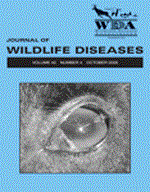Mycobacterium bovis, the causative agent of bovine tuberculosis, has become established in free-ranging white-tailed deer Odocoileus virginianus in northeastern Michigan. The practice of supplemental feeding of white-tailed deer during the winter is believed to contribute to transmission of M. bovis between deer. The current study was conducted to determine the ability of M. bovis to survive on various feedstuffs commonly used as supplemental feed for deer in northeast Michigan (i.e., apples, corn, carrots, sugar beets, potatoes, and hay) and the effect of maintenance at −20 C, 8 C, and 23 C on survival. Mycobacterium bovis survived on all feedstuffs at all temperatures tested for at least 7 days. At 23 C, M. bovis could still be isolated from samples of apples, corn and potatoes at 112 days. This study suggests that contamination of feedstuffs by M. bovis-infected deer could act as a source of indirect transmission between deer because M. bovis is able to survive in temperatures similar to those recorded during winter months in northeastern Michigan. Current efforts to ban or control supplemental feeding of deer should have a positive effect on decreasing transmission of M. bovis among deer.
How to translate text using browser tools
1 October 2006
Survival of Mycobacterium bovis on Feedstuffs Commonly Used as Supplemental Feed for White-tailed Deer (Odocoileus virginianus)
Mitchell V. Palmer,
Diana L. Whipple

Journal of Wildlife Diseases
Vol. 42 • No. 4
October 2006
Vol. 42 • No. 4
October 2006
Feedstuffs
Mycobacterium bovis
Odocoileus virginianus
survivability
TUBERCULOSIS
white-tailed deer




